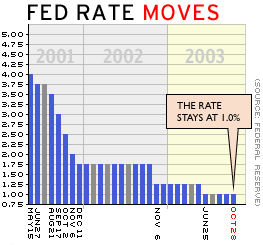NEW YORK (CNN/Money) -
With stronger-than-expected numbers coming in almost daily and the Fed sitting on its hands, some observers say the central bank is playing chicken with the economy, creating the risk of unnecessarily painful interest-rate hikes down the road.
But some other analysts see plenty of potential trouble spots for the economy and say the chances are small that the Federal Reserve will let inflation get out of control.

Tuesday brought another bundle of good economic news, with the third quarter's economic growth rate revised from "blistering" to "super blistering" and a report that consumer confidence is at its highest level in more than a year. Housing was weaker than expected, but it was expected to cool down, anyway.
Meanwhile, payrolls have grown for three straight months, and key measures of inflation are showing signs of a pickup.
You would have little idea this was going on, however, if you got all your economic news from the Fed's official proclamations. For the past several months, Fed interest-rate decisions and "beige book" economic reports have been about as soothing to read as "Sinners in the Hands of an Angry God," and some observers are getting fed up (no pun intended).
"The Fed is selling us a bill of goods," said Russell Sheldon, senior economist at BMO Nesbitt Burns. "The Fed has plenty of evidence that the economy is boiling. They don't care. 'Let it boil,' they say."
Is the Fed lying?
So far, the Treasury market apparently believes the Fed's story that the economy needs to grow at a robust pace for a while before the central bankers can stop worrying about a possible, dangerous drop in prices, which would hurt corporate profits and economic growth.
| Related stories
|

|
|
|
|
But Sheldon and some other economists don't buy it, believing the Fed is manipulating the bond market to keep long-term interest rates low. Though the Fed's main policy tool is a short-term overnight bank lending rate, it also can affect longer-term rates -- as was made painfully clear this summer, when some Fed bungling momentarily sent long-term rates soaring.
Since then, the Fed has been careful to avoid raising Treasury investors' expectations again that it plans to raise rates soon, perhaps even by being disingenuous about its true view of the economy -- a dangerous game, some economists believe.
"I think the Fed ought to be honest about what it believes," said David Kelly, senior economist at Putnam Investments in Boston. "No good can come from having artificially low interest rates."
Kelly's biggest fear is that the Fed could create another asset bubble, much as cheap money helped create a housing bubble in the 1980s and an even more dangerous stock-price bubble in the 1990s.
Though the Fed's stated goal is to insure a balance between economic growth and inflation, some analysts say the Fed could end up allowing too much inflation to creep in.
"The Fed's history has been that they solve one problem but create another," said Anthony Crescenzi, bond market analyst with Miller Tabak & Co., citing Kelly's examples and more.
"This time, they want to keep rates low to fight deflation -- a demon that may have vanished already. They might be successful again, but something else might build up, some other unintended consequence, including some inflation."
Danger of disruptive rate hikes?
If the bond market starts to worry that inflation will get ahead of the central bank, then investors could push long-term rates higher, forcing the Fed to raise its own rates sooner than it would like -- with both of those increases slowing the economy.
"The potential for a highly disruptive round of tightening grows day by day," said Brian Wesbury, chief economist at Griffin Kubik Stephens and Thompson in Chicago.
Wesbury said the economy looks much like it did in 1993, when a jobless recovery was ending and the Fed, according to some observers, ignored signs of higher inflation, forcing the central bank to raise interest rates aggressively in 1994 and crippling the bond market.
Still, Wesbury and other Fed critics doubted the economy would suffer from the Fed's inaction in the short term, if at all -- the economy grew just fine in 1994, despite the bond market's pain, Wesbury noted.
And other economists believe it's a little early to dust off the old Whip Inflation Now buttons from the Ford administration.
Payrolls haven't started adding enough jobs to bring down the rate of unemployment, wage growth has continued to decelerate, and there's still outright deflation in some goods prices, due in part to overseas competition, they say.
In this environment, the Fed can afford to sit on the sidelines a little longer than usual, these observers say.
"It's not that I think inflation will be dead forever, but there are very powerful global forces keeping it low," said Robert Brusca, chief economist at Native American Securities in New York. "The bond-market vigilantes are clearly trying to string up the innocent."

|

